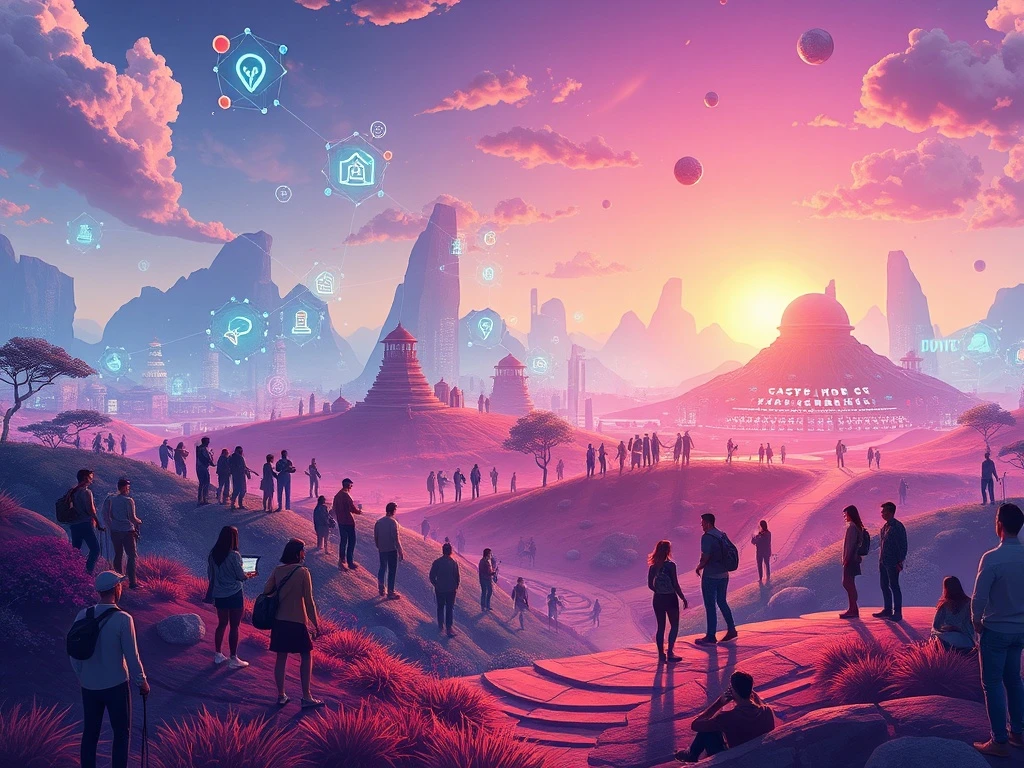The digital landscape has undergone radical shifts. It has transformed how we interact, create, and even earn. For entrepreneurs and businesses, understanding these shifts is crucial. Today, **Web3 and AI** are reshaping the vibrant world of gaming. They open unprecedented opportunities for innovation and community building. This article explores how these cutting-edge technologies are revolutionizing gaming communities. They empower players and creators alike.
Understanding the Digital Evolution: From Web1 to Web3
To grasp the revolutionary potential of **Web3 and AI** in gaming, one must first understand the internet’s evolution. The web has progressed through distinct eras. Each version added new capabilities. This progression moved from static pages to interactive platforms and now to decentralized ecosystems.
Web1: The Dawn of the Digital Frontier
The early internet, known as Web1, was a read-only landscape. Users primarily consumed static content. Websites served as digital brochures. They provided information without much interaction. This era fostered basic creativity. However, user influence over data and content remained minimal.
Web2: The Rise of Interaction and Centralization
Web2 marked a significant shift. It introduced read-write abilities. Users could now create and share content. Social media platforms, blogs, and interactive websites emerged. This era brought unprecedented connectivity. It also led to the corporatization of the internet. Large tech companies began centralizing data. They monetized user interactions through advertising and data brokerage. While empowering user-generated content, Web2 also raised concerns about privacy and control.
Web3: The Decentralized Internet Takes Hold
Web3 represents the internet’s next iteration. It leverages blockchain technology. This version aims to decentralize the web. It returns ownership of data and digital assets to users. Furthermore, Web3 empowers creators to self-monetize their projects directly. This shift fosters a new era of creativity. It also promotes user autonomy. This decentralized framework provides a fertile ground for innovation, especially within gaming communities.
Web3’s Transformative Power in Gaming
Web3 brings a brand-new field of play to the gaming industry. It introduces concepts like digital ownership and player-driven economies. These elements redefine the traditional gaming experience. Gamers are no longer just consumers. They become stakeholders and creators within the game worlds.
Empowering Players Through Ownership
Blockchain technology enables true digital ownership. Non-Fungible Tokens (NFTs) represent unique in-game assets. Players can own characters, skins, weapons, and virtual land. This contrasts sharply with traditional games. In those, players only license their digital items. With Web3, players can buy, sell, and trade their assets on open marketplaces. This creates real-world value for their in-game efforts.
Consider games like Axie Infinity and CryptoKitties. These early blockchain games demonstrated the power of digital ownership. Players could breed, collect, and battle unique digital creatures. They could also earn cryptocurrency through gameplay. These models showcase how Web3 empowers users to build communities and generate income. Such projects prove that success extends beyond mere monetary gains. Chris Dixon of a16z suggests many fruitful Web3 projects are “smaller-dollar things” built around “communities.”
New Economic Models and Community Engagement
Web3 fosters novel economic models within gaming. Play-to-earn (P2E) games reward players with cryptocurrency or NFTs. This incentivizes active participation. Community-governed games, or Decentralized Autonomous Organizations (DAOs), also gain traction. Here, players hold governance tokens. They can vote on game development decisions. This direct involvement strengthens community bonds. It also ensures the game evolves according to player preferences. The Web3 in Gaming market is growing fast. Projections estimate it will eclipse $131 billion by 2034. This growth reflects the increasing adoption and potential of these decentralized models.
AI: The Engine of Next-Gen Gaming Experiences
Much like Web3, artificial intelligence (AI) promises greater freedom for creators and gamers. AI tools streamline development processes. They also enhance gameplay immersion. They help users achieve more with fewer resources. This technology revolutionizes both game creation and the gaming experience itself.
Streamlining Game Development with AI
AI removes significant skill gaps from game creation. Even first-time creators can leverage advanced features. These tools automate complex tasks. They allow developers to focus on creative vision. This efficiency accelerates game production. It also lowers the barrier to entry for aspiring game designers. Key AI applications include:
- Procedural Content Generation (PCG): AI creates vast game worlds, characters, and assets. This saves significant time and resources. Developers can generate endless variations of environments.
- Intelligent NPCs (Non-Player Characters): Large Language Models (LLMs) and AI chatbots integrate seamlessly into game worlds. They generate dynamic dialogues and behaviors. This creates immersive and unpredictable experiences for gaming communities.
- Adaptive Difficulties: AI systems track and analyze player inputs. They adjust game parameters in real-time. This creates a digital world that reacts uniquely to every player. It ensures optimal challenge and engagement.
- Asset Creation and Ownership: AI assists in creating collectible in-game assets. It also helps generate blockchain-based ownership contracts. This facilitates active and verifiable in-game economies.
Enhancing Player Experience and Community Interaction
AI is not just for content creation. It also helps foster more active gaming communities. AI-powered tools analyze player behavior. They suggest relevant content or connections. This can fuel discussions across novel social platforms. AI chatbots can moderate forums. They can answer player questions. This enhances overall community health and engagement. The integration of **Web3 and AI** provides powerful new avenues for digital interaction.
The Synergy: Where Web3 and AI Converge in Gaming
The true revolution in gaming emerges when Web3 and AI technologies converge. They create experiences previously unimaginable. This synergy fosters a new paradigm of interactive entertainment. It emphasizes user control and dynamic content. This convergence offers immense potential for gaming communities.
Creating Dynamic and User-Owned Worlds
Imagine AI-generated worlds. Players own these worlds through Web3 protocols. AI can continuously expand and evolve these environments. Meanwhile, Web3 ensures player ownership of all assets created within them. This means players have a vested interest in the game’s ongoing development. They can even profit from their contributions. For example, AI might generate a unique weapon. Web3 then allows the player to truly own and trade that weapon.
Personalized and Decentralized Experiences
AI adapts gameplay to individual players. Web3 provides a decentralized framework for these personalized experiences. This ensures data privacy and user control. AI can tailor narratives. It can adjust challenges. Web3 guarantees that these personalized elements belong to the player. They are not controlled by a central entity. This combination leads to highly engaging and secure gaming environments.
Building Robust Gaming Communities with Decentralized Tools
Experts agree: **Web3 and AI** in gaming are best received when they empower communities. This means giving players true ownership over their games and social interactions. The success of Web3 games heavily relies on community engagement. Therefore, innovative platforms are emerging to bridge the gaps between online and real-world communities.
Discord and Emerging Platforms
Discord has long been a hub for gaming communities. Its Embedded App SDK now presents new avenues for users to create in-app games. This fosters more direct community-driven content. However, as Web3 becomes more integral, new platforms specifically designed for decentralized community building are launching. These platforms aim to enhance social interaction. They also seek to facilitate real-world meetups.
One such platform is the soon-to-be-launched Nerd Culture. It aims to help gamers bring their online communities into the physical world. This convergence is an exciting prospect. It spurs innovation by bringing like-minded people together. It also helps individuals find friends both online and locally. Nerd Culture uses Web3 tools to help members build custom communities. It assists them in finding people who share unique interests. Furthermore, it helps plan safe meetups in the physical world.
Co-Founder Steven Weingarth spoke about the project’s genesis: “When I moved to LA, I was shocked by how difficult it was to find a D&D group. Sites upon sites, Discord invites, bouncing between Reddit threads and Meetup and Facebook groups. It felt like yelling into a void. So our team set out to build the platform we all wish existed — a single place to connect and share stories with people over the things we love.” This vision perfectly aligns with the community-centric ethos of Web3.
Empowering Players: Ownership and Creativity
The core promise of **Web3 and AI** in gaming is empowerment. Players move from passive consumers to active participants and owners. This shift unlocks new levels of creativity and engagement. When players have a financial and creative stake in a game, their commitment deepens. They contribute more actively to its ecosystem.
Web3 grants players true ownership of their digital assets. This means they can trade, sell, or even lend their in-game items. This creates vibrant player-driven economies. AI, on the other hand, provides the tools for unprecedented creative freedom. Players can use AI to generate custom content. They can design unique experiences within the game. This combination fosters a truly dynamic and user-centric gaming environment.
The Road Ahead: Challenges and Opportunities
While the potential of **Web3 and AI** in gaming is immense, challenges remain. Scalability of blockchain networks, user experience complexities, and regulatory uncertainties are key hurdles. However, ongoing innovation addresses these issues. Developers are building more intuitive interfaces. They are also creating more robust infrastructure. The opportunities for new business models and immersive experiences far outweigh the challenges. The future of gaming promises greater player agency and community collaboration.
Summing Up
Ultimately, if **Web3 and AI** are to revolutionize gaming, developers must pay equal attention to nurturing community engagement. Novel services like Nerd Culture offer an ideal space to do just that. The convergence of decentralized ownership, AI-powered content, and strong community platforms is shaping a new era. This era promises more immersive, equitable, and player-centric gaming experiences for everyone.
Frequently Asked Questions (FAQs)
Q1: How does Web3 enhance player ownership in games?
Web3 uses blockchain technology to provide true digital ownership of in-game assets. Players own items as NFTs (Non-Fungible Tokens). This allows them to buy, sell, or trade these assets freely outside the game’s ecosystem, giving them real economic value.
Q2: What specific roles does AI play in revolutionizing game development?
AI streamlines game development through procedural content generation (creating vast worlds), intelligent NPCs (dynamic characters), adaptive difficulty (tailoring gameplay), and asset creation. These tools reduce development time and enhance immersion.
Q3: Can Web3 and AI improve gaming communities?
Yes, significantly. Web3 empowers communities with decentralized governance and ownership, giving players a say in game development. AI enhances community interaction by improving in-game experiences and facilitating connections, leading to more active and engaged groups.
Q4: What is the main difference between Web2 and Web3 in the context of gaming?
Web2 gaming is centralized, with game developers controlling all assets and data. Web3 gaming is decentralized, giving players true ownership of their digital assets and often a voice in game governance through blockchain technology.
Q5: How does a platform like Nerd Culture leverage Web3 for gamers?
Nerd Culture uses Web3 tools to help members build custom communities based on shared interests. It facilitates finding like-minded individuals online and locally, and enables planning safe real-world meetups, bridging the gap between digital and physical social connections.






















